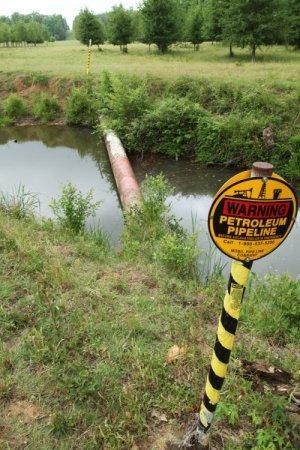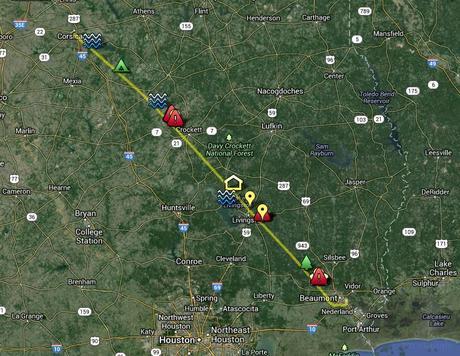from Safe Community Alliance
The 205-mile segment of the 20-inch diameter Pegasus Pipeline which runs from Corsicana to Beaumont, Texas was built 60 years ago, in 1954. Since then, many things have changed. Where once the pipeline traveled through virtually unpopulated countryside carrying diesel oil, there are now lakes and neighborhoods under which it runs. This pipeline additionally has been exposed to the deteriorating factors of time, corrosion, and the diluted tar sands bitumen it so recently carried. More information about this stretch of pipeline should be seen at Pinewood Estates, and concerns an affected neighborhood that did not exist in 1954.
What has changed during the one year that this pipeline has been shut down? Probably nothing besides its age and continued exposure to external environmental factors. Since the time of the original April 2, 2013 Pipeline Hazardous Materials Safety Administration (PHMSA) Corrective Action Order (CAO), ExxonMobil has always insisted that this southern section of its Pegasus pipeline should remain open (see Page 4,Issue 2, of May 10, 2013 Post-Hearing Decision regarding CAO), even though it is only five years newer than the segment that ruptured.
The major problem with re-starting this pipeline is the public’s lack of knowledge of the condition of the pipeline. The condition of much of the northern segment had been formally vetted thanks to the action of Arkansas Representative Griffin. His efforts to release the results of 2010 pig tests showed that ExxonMobil plowed right ahead with their transport of diluted tar sands bitumen in spite of the 4000-plus anomalies (dents, bad welds, corrosion – in places up to 70% of the 5/16-inch pipe thickness) that were found.
Unfortunately, even though SCA has prodded Texas congresspersons to push PHMSA & ExxonMobil to reveal test results on the southern segment, nothing has surfaced. It would seem that public awareness is not a priority. Nothing seems to have changed in ExxonMobil’s, or PHMSA’s attitudes about the safety of the Pegasus Pipeline. The likelihood that there are anomalies that have not been addressed remains very high.

View this map of the Pegasus Pipeline Southern Segment in a larger Google format
Certain environmental conditions might tend to have led to potentially more anomalies in this southern segment. There is a distinct climatological diference between the northern, Patoka(IL)-to Corsicana(TX)segment, and that of the southern, Corsicana-to-Beaumont portion. Consulting historical climatological data maps, one notices that from Corsicana towards Beaumont and the Texas Gulf Coast average annual precipitation increases from about 36 inches, to 55 inches. Average temperatures change from 67 degrees Fahrenheit at Corsicana, to 70 at Beaumont. Precipitaion ranges from 41 inches at Patoka, up to about 55 inches near Mayflower, Ar., and then back down to 36 inches at Corsicana, while temperatures range from 57 degrees at Patoka, and 65 at Mayflower, to 67 at Corsicana.
Soil moisture and temperature together affect the rate of external chemical corrosion of buried metal pipe. With the warmer, wetter soils where the southern segment of the Pegasus Pipeline is buried, one would expect to experience greater rates of external corrosion. Then there are those locations where the pipe is not even buried.
Probably the most burning issue involving the re-start of the Pegasus Pipeline is the question of what exactly it will be transporting. ExxonMobil will likely say that it will be carrying West Texas crude oil; and that may very well be something that it does transport. But with the fact that this leg of the Pegasus begins at a tank farm at Corsicana, and that construction of the new Seaway Loop, destined to carry diluted tar sands bitumen, just like its twin, will place it right next to this tank farm, it becomes easy to see that dilbit is still in the picture for the Pegasus.
There are too many unknowns for the public to feel comfortable with the Pegasus Pipeline re-starting. There is more than enough history with this pipeline, and with ExxonMobil’s “profits first” attitude for the public to feel comfortable with the Pegasus Pipeline re-starting.
Safe Community Alliance opposes the re-start of this Pegasus Pipeline.

